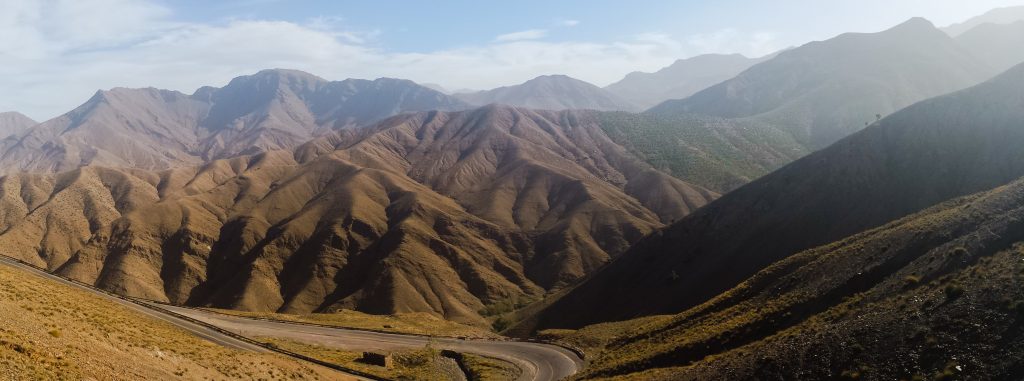Spanning a huge stretch of land across northwest Africa, the Atlas Mountains have proven to be some of the most popular with trekkers from all over the world. These peaks are magnificent to gaze across from afar – and, as it turns out, they’re rich in all kinds of useful minerals, too!
Regardless of your own sense of adventure, let’s take a look at some fun facts about the Atlas Mountains.
1. There’s lots to find out here!
The Atlas Mountains are highly rich in lead ore, mercury, silver, iron ore, marble, natural gas and much more. You’ll even find gold in these hills, too – not so much of a gold rush going on, mind!
2. Take a deep breath!
The air up in the Atlases is fairly unique. It’s a combination of mass between cold polar air from the north, and tropical, humid (and tremendously hot) air that drifts up from the southern side.
3. Standing on the shoulders of giants…
The absolute tallest of all the Atlas Mountains is Toubkal. It’s around 13,671 feet tall and just outstretches Timzguida and Ras Ouanoukrim, both of which make up the collective Ouanoukrim mountain. All of these peaks can be found in Morocco!
4. A true creature feature!
The Atlas Mountains were once home to some fascinating but now sadly extinct beasts. These included the Barbary lion, the Atlas bear, and the North African elephant.
5. It’s a massive natural divider.
Weirdly enough, the Atlantic and Mediterranean coasts never quite meet the Sahara Desert purely thanks to the Atlas Mountains – it’s a huge natural divider!
6. Is anybody there…?
The thickness of the Atlas Mountain spine can prove to be difficult to communicate through (as in, to submit signals via). Oddly enough, local people have come up with a few ways around this. Atlasians have created their own communication system so they can keep in touch despite the huge morass!
7. Five countries play host to the Atlas Mountains.
The Atlas Mountains are largely consumed by Morocco, Mauritania and Algeria, though you will find small sections of the range jutting into Libya and Tunisia, too.
8. A whole city was lost here.
A city located in the heart of Tell Atlas, Blida, fell completely as a result of a devastating earthquake back in the 1800s. The city was completely obliterated, reportedly taking around 265,000 people with it.
9. Get lost… on purpose?
There are plenty of breath-taking trails and walks you can take across and around the Atlas Mountains, with Kasbah Aït Benhaddou being particularly interesting – it’s played a backdrop in various movies, including the smash hit Gladiator back in 2000!
Saharan Atlas
10. The caves that time forgot!
Some areas of the Atlas Mountains are genuinely ancient. In fact, the Youssef Ben Tachfine, a cave found deep in the range, is said to date all the way back to mid-paleolithic times!
11. Parkland as far as the eye can see.
The Atlas Mountains play host to lots of national parkland, too. In 1942, the hugely popular Toubkal National Park was first set up – it’s around 380 square km large.
12. Morocco is reliant on Atlas peaks.
Morocco is already highly popular with tourists traveling from all over the world. However, much of its tourism comes from the Atlas Mountains – part of the country’s $6 billion+ tourism intake!
13. There’s more ranges than you think!
While we’ve been referring to the Atlas Mountains as a range, it’s technically four different ranges compacted into one. The Middle, High and Anti-Atlas range is found out in Morocco, while the Aurès and Tell Atlas ranges are shared between Tunisia and Algeria. Algeria does have an Atlas range all of its own, however – the Saharan Atlas peaks.
FAQs About the Atlas Mountains
Why are they called the Atlas Mountains?
The Atlas Mountains are named after a Greek God - specifically, the Titan Atlas, who is often depicted as carrying the Earth on his shoulders!
Do people live in the Atlas Mountains?
Yes - the Berber tribes live in the Atlas ranges, and have done so for centuries - they’ve developed their own languages and communications systems along the way.
Are the Atlas Mountains cold?
Typically, the Atlas peaks get as cold as you’d expect from most mountain ranges, though as they are close to the equator, they’re not as chilly as some peaks you’ll find out in North America. Typically, temperatures might fall to as low as 50 F in the daytime.
Further reading:
https://factcity.com/tag/africa/
https://www.audleytravel.com/morocco/places-to-go/the-atlas-mountains
https://www.lonelyplanet.com/morocco/high-atlas-mountains
Do you know any fun facts about the Atlas Mountains? Share them in the comments below!
